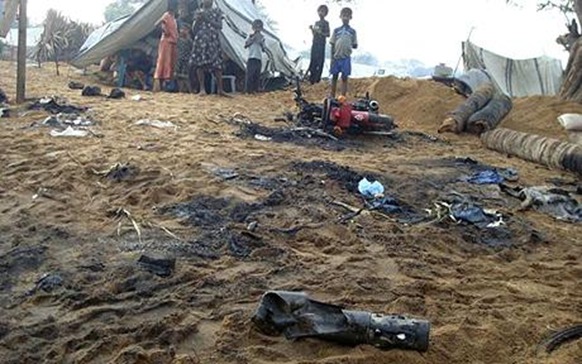
Fears of a humanitarian crisis in Sri Lanka are growing after the government said 280,000 refugees who fled the conflict zone would be held in overcrowded camps for up to two years.
Officials said the delay was necessary to screen for Tamil Tigers and rebuild and restore electricity and water supplies to thousands of homes in the vast areas of land destroyed in the 26-year civil war.
But the plan increased concern for the safety of those held in the camps as charities gave warning that conditions were deteriorating quickly.
There was growing anger over Sri Lankan government restrictions on access to the camps for international aid groups, including the United Nations and the Red Cross.
Save the Children said the lives of mothers and children in the "overcrowded" camps of Vavuniya would be at risk unless extra food and water was provided soon.
It said almost a third of them were suffering from malnutrition when they arrived at the camps, and many had spent days without clean drinking water.
The Sri Lankan government confirmed refugees would be held in the camps surrounded by razor wire for up to two years, saying it would not be dictated to by the UN.
Mr Laxman Hulugalle, director-general of Sri Lanka’s National Security Media Centre, said the government would provide only basic food, shelter, education and health care at the camps. "You can’t expect five star treatment," he said.
Overcrowding is expected to increase in the coming days as an estimated 50,000 civilians make their way in from the former war zone.
Dr Balwant Singh, Save the Children’s South & Central Asia Regional Director, said: "The lives of children will be endangered if the health of mothers is not made a priority. Mothers and children have already suffered greatly after weeks of being trapped without adequate access to food, water and medical attention. We urgently need to step up our assistance to them."
The UN led calls for restrictions to be lifted and for humanitarian agencies to be allowed free access to the former war zone where thousands of civilians and Tamil Tiger fighters are believed to have been killed.
It accused the government of deliberately excluding its officials from the camps, and demanded Colombo allow its officials in to examine conditions.
Elisabeth Byrs, spokeswoman for the UN Office for the Co-ordination of Humanitarian Affairs, said: "We need to have access, I repeat, total access, without the least let or hindrance, for the UN, for NGOs and for the Red Cross."
Its refugee agency, the United Nations High Commissioner for Refugees, said 80,000 Tamil civilians had fled the former war zone in the last three days, raising the total number of displaced to 280,000.
Its spokesman confirmed the Sri Lankan government was blocking humanitarian access, but said he did not know why. "It’s urgent that assistance gets into those camps and that we are able to deliver. We’ve got lots of humanitarian supplies that need to be delivered," he said.
U N Secretary-General Ban Ki-Moon is expected to exert further pressure on Colombo to lift restrictions when he visits Sri Lanka on Friday. He will fly over the former war zone and visit refugee camps and hospitals treating civilians for shell, shrapnel and bullet wounds.
Sri Lanka declared a public holiday on Wednesday to celebrate the defeat of the Tamil Tiger rebels.
(For updates you can share with your friends, follow TNN on Facebook and Twitter )
